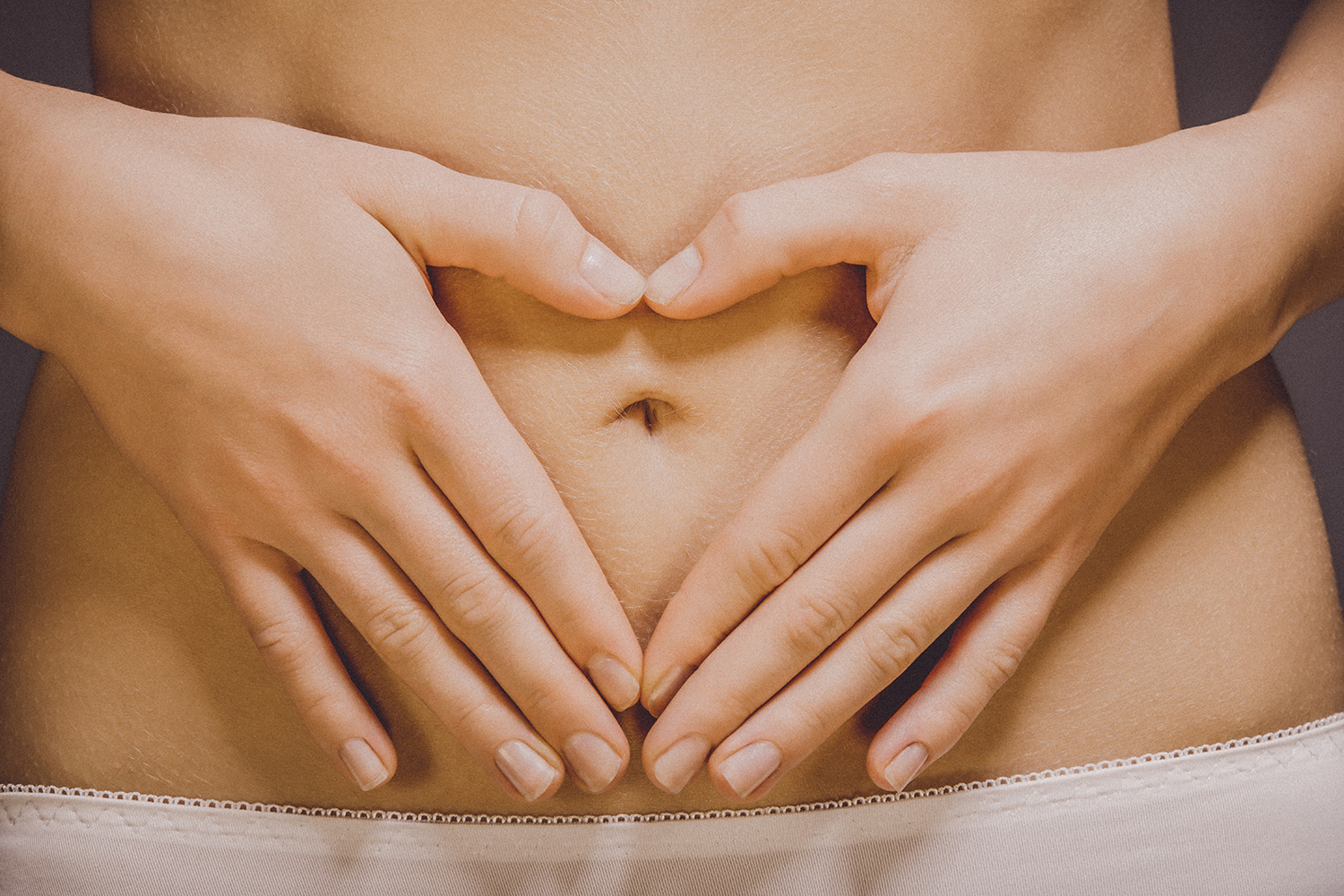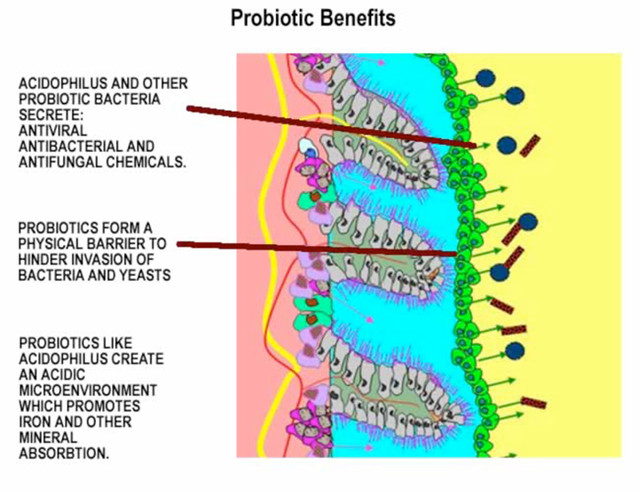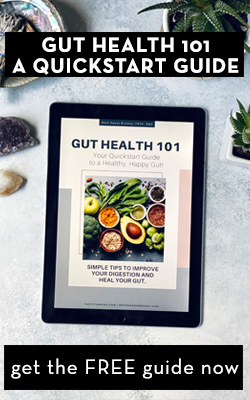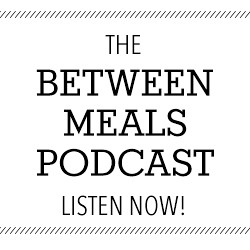-
Restore Your Gut Health // The Four Rs of Gut Healing.

Restore Your Gut Health with the Four Rs of Gut Healing
Our health begins in the gut! It is estimated that as much as 80% of our immune system is located in our gut and that over 90% of the chemicals responsible for regulating moods, neurotransmitters such as serotonin and dopamine, are made in our gut. Not only is it important to be sure our digestion is functioning properly so we can feel our very best, but healthy digestive function is also crucial to being able to absorb, assimilate and use the nutrients we consume daily in our healthy, whole foods diet.
If you are suffering from digestive discomfort like bloating and gas, stomach aches, indigestion or acid reflux, nausea, chronic diarrhea or constipation – I can assume you are well aware that those are symptoms of an imbalanced gut. But, did you know that seasonal allergies, sinus congestion, a compromised immune system (and yes, autoimmune disease), fatigue, mood imbalances, hormone imbalances, bad breath, weight gain, acne, metabolic dysfunction – these too can all be signs of gut dysbiosis.
Gut impermeability, gut inflammation and other digestive dysfunction symptoms may be displayed in your gut but their effects are systemic and can affect the whole body. The gut is the core of our health and it is essential to have a healthy gut in order to have a healthy body. Gut dysbiosis can be caused by a myriad of things, from chronic antibiotic use, an unhealthy, imbalanced diet that lacks nutrients or contains harmful substances, alcohol abuse, illness, chronic high stress levels, medications and other lifestyle issues.
-
The Benefits of Probiotics
I am very excited today to share this post with you. Not only is the lovely Eliza Schneider of Embodied Emergence joining us again, to share her thoughts on probiotics, but I am also sharing some great probiotic encouraging recipes from some wonderful friends of mine, as well. Probiotics have single-handedly changed the game for my always troubled gut, my only complaint of probiotics is that I didn’t learn of them sooner. I am so happy Eliza took some time to explain probiotics and share all of the amazing benefits we get from them.
——————————————————————————————
If you’re interested in taking better care of your digestion you’ve surely been hearing buzz words like “probiotic,” “prebiotic,” “digestive enzymes,” “intestinal flora”… don’t be scared by these terms! You’re not alone if you’re thinking “WTF is this biotic stuff all about? Should I be taking supplements? Do I need this stuff? What kind should I be getting?….!!??”
Don’t fear! The digestive detective (my new self-title, haha) is here to “break it down for you,” so to speak.
Today we’re going to focus on your intestines. These windy, long intestinal tunnels have villi (tiny hairs) capture the nutrients and send them into your blood stream. These villi are covered with tiny bacteria (probioitics). The probiotics repel yeast, bad bacteria, and fungi from getting into the blood stream. It is VITAL that the nutrients are able to absorb into the blood stream at this point in the digestive process, and the probiotics assist in allowing this to happen. The intestines are the final frontier for the digested food before it’s moved into the colon and then released as waste.
On average, we have over 1,000 different types of bacteria that live in our digestive track and help to break down food and absorb nutrients! (Amazing, right!?) But sadly, things like antibiotics and diets filled with processed foods can cause these helpful bacteria to die off. As I mentioned in a previous blog post on POO, foods that cause inflammation in the body can cause the villi to be covered in a mucous that prevents mineral and nutrient absorption! This in turn can cause problems like constipation or diarrhea, IBS, abdominal pain, cramps, bloating and other not-so-fun digestive problems.
Something to be aware in today’s factory-farmed world is that there can even be trace antibiotics in the meat you are eating. Conventional farmers often add antibiotics to animals who are grown close together and are prone to bacterial infections. Also, some fish are packed in antibiotics so that they don’t develop bacteria on them as they are shipped to stores. By choosing organic fish and meats you’ll avoid these risks.
The GOOD NEWS is that probiotics (supplements that help rebuild the intestinal bacterial [AKA flora]) can relieve many of these problems! Probiotics are microorganisms that offer some form of health benefit to the host. Prebiotics, on the other hand, are a special kind of dietary fiber that nourish the existing bacteria already living in the colon. They are naturally occurring in many plants. Basically, prebioitics are fibers (non-living) that help feed the good bacteria (probioitics!).
In this post, we are going to focus on PRObiotics, the actual beneficial bacteria that we ingest either in foods, or through supplements and are produced naturally (in a healthy body) in our intestines.
Some foods with natural probiotics in them are:
- Plain yogurt (Be sure to pick one without too many filler sugars and that says something like “live and active cultures” to be sure you’re getting good bacteria!)
- Kefir (fermented milk drink made with kefir grains)
- Fermented foods like sauerkraut, pickles, kimchi, etc
- Miso (fermented soybean paste… makes great soups, and yummy dressings!)
- Tempeh (fermented soybean)
- Kombucha (basically bacterial cultures that in a tea-based drink)
- Dark Chocolate (YESS!!!)
- Olives (also go through a brine-fermenting process) Read the rest of this entry »






